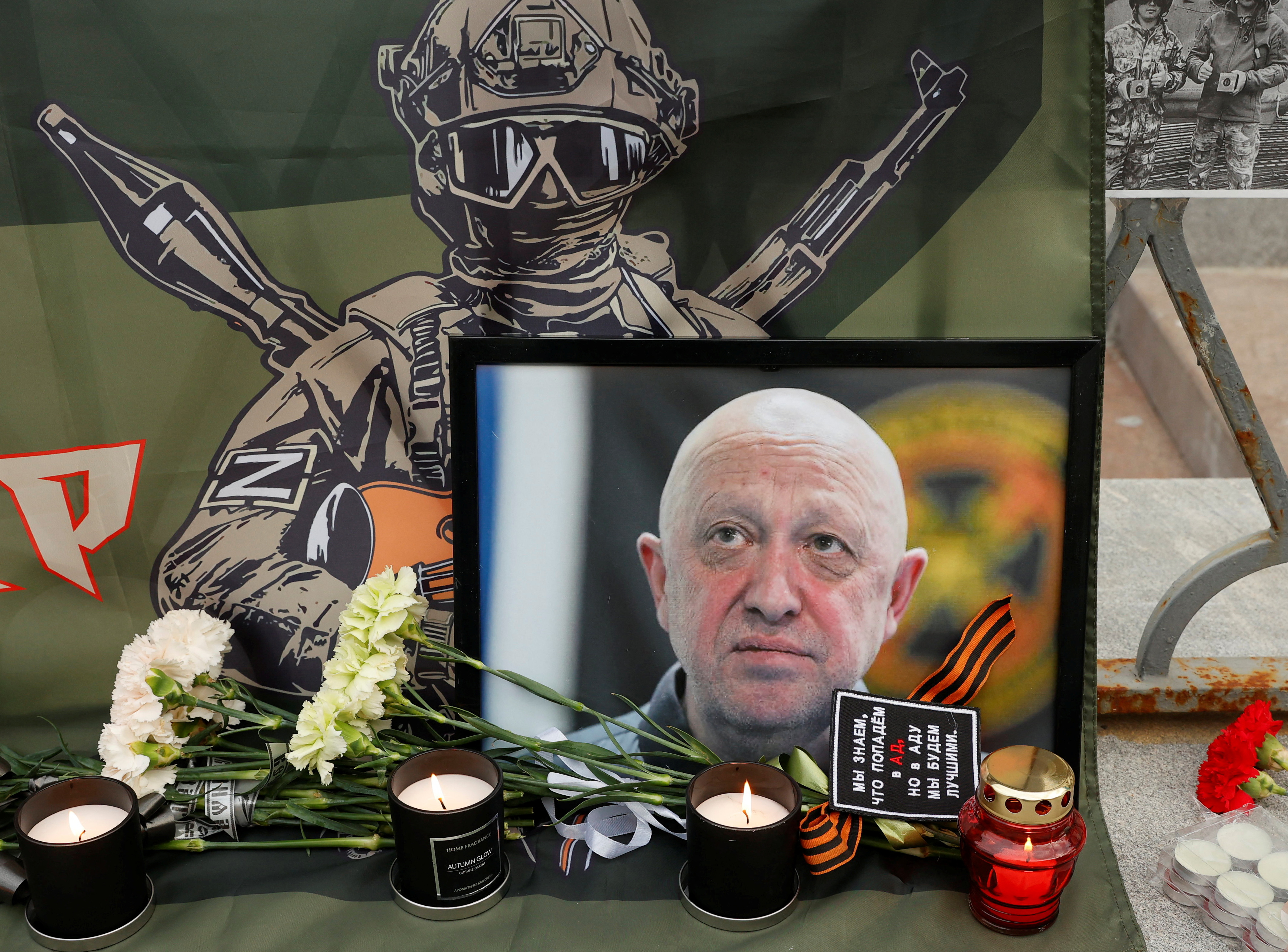
Yevgeny Prigozhin, the Wagner Group chief who died in a plane crash last week, has been buried at a cemetery on the outskirts of St Petersburg.
The funeral took place on Tuesday, away from the glare of the media and in stark contrast to the brazen, self-publicising style with which Prigozhin had fanned his reputation far beyond Russia for ruthlessness and ambition.
“The farewell to Yevgeny Viktorovich took place in a closed format. Those who wish to say goodbye may visit Porokhovskoye cemetery,” his press service said in a short post on Telegram.
Pictures published on social media showed Prigozhin’s dark granite tombstone surrounded by a sea of flowers, mostly red roses, in the cemetery on the northeast edge of his hometown.
Secrecy had surrounded the funeral arrangements for the Wagner mercenary boss who was killed in a plane crash on August 23, two months to the day after he staged a mutiny in the biggest challenge to President Vladimir Putin’s rule since he rose to power in 1999.
The head of PMC "Wagner" Yevgeny Prigozhin was buried in St. Petersburg.
Russian channels published a photo of Prigozhin's grave, his father is buried nearby.
Peskov said today that Putin would not attend Prigozhin's funeral. pic.twitter.com/CGLkIOZTjI
— Sprinter (@Sprinter99800) August 29, 2023
It meant the event could not be turned into a large-scale public show of support for Prigozhin, a brutal figure who was nevertheless admired by some in Russia for throwing his fighters into the fiercest battles of the war in Ukraine and speaking openly about the shortcomings of the Russian military and its leadership.
In recent days admirers had heaped flowers on makeshift shrines to Prigozhin in Moscow, St Petersburg and elsewhere.
“There is sort of a cult following around Wagner,” Jack Margolin, a researcher on private military companies, told Al Jazeera. “There is quite a following of not just former fighters but people who admire the Wagner Group and what they represent for this resurgence of Russian nationalism.”
‘A long history’
The White House on Tuesday came close to declaring the Kremlin was responsible for Prigozhin’s death.
“We all know that the Kremlin has a long history of killing opponents,” said White House press secretary Karine Jean-Pierre. “It’s very clear what happened here.”
Her comment was the closest US statement yet on the possibility that Putin directed the killing of Prigozhin, who launched a brief revolt against the defence ministry over its handling of the Ukraine war.
The Kremlin has rejected as an “absolute lie” the suggestion that Putin ordered his death in revenge for the June mutiny. It said earlier on Tuesday the president would not attend the funeral.
Two other top Wagner figures, four bodyguards and three crew members were also killed when Prigozhin’s Embraer Legacy 600 private jet crashed north of Moscow.
It is still unclear what caused the plane to crash, but villagers near the scene told Reuters news agency they heard a bang and then saw the jet plummet to the ground.

Mutinous mercenary
After months of insulting Putin’s top brass with a variety of crude expletives and prison slang over their perceived failure to fight the Ukraine war properly, Prigozhin took control of the southern city of Rostov in late June.
He then marched towards Moscow before turning back 200km (125 miles) from the capital. Putin initially cast Prigozhin as a traitor whose mutiny could have tipped Russia into civil war, though he later made a deal with him to defuse the crisis.
The day after the crash, Putin sent his condolences to the families of those killed and said he had known Prigozhin for a very long time, since the chaotic years of the early 1990s.
“He was a man with a difficult fate, and he made serious mistakes in life,” Putin said, while describing him as a talented businessman.
Before the mutiny, Prigozhin had quipped that his nickname should have been “Putin’s butcher” rather than “Putin’s chef” – a moniker acquired after his catering company won Kremlin contracts.
He always professed loyalty to Putin, though he said his defence minister, Sergei Shoigu, was so incompetent he should executed for his treachery.
After Prigozhin’s death, Putin ordered Wagner fighters to sign an oath of allegiance to the Russian state – a step that Prigozhin had opposed due to his anger at the defence ministry that he said risked losing the Ukraine war.
Investigators said on Sunday that genetic tests had confirmed the identities of all 10 people killed in the crash, who also included two pilots and a flight attendant.
Earlier on Tuesday, Valery Chekalov, the head of Wagner logistics, was buried at another St Petersburg cemetery.







